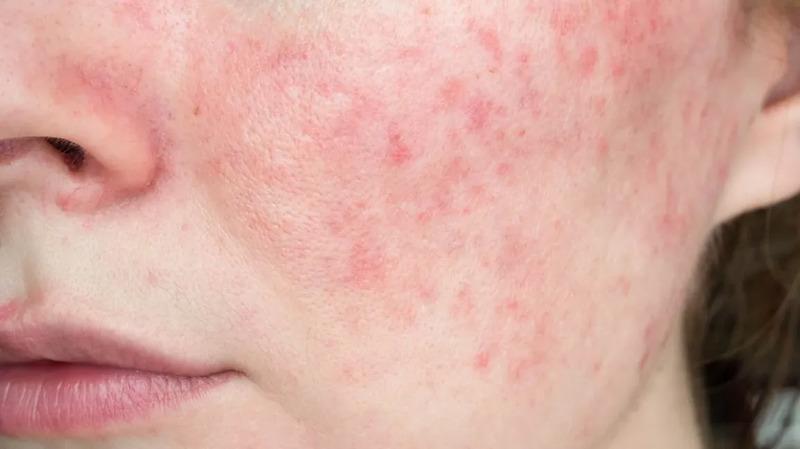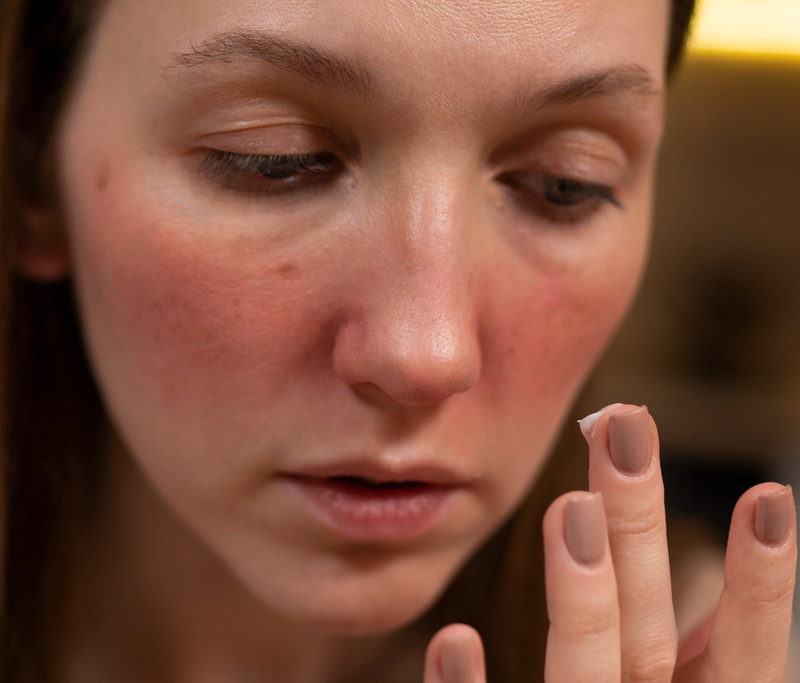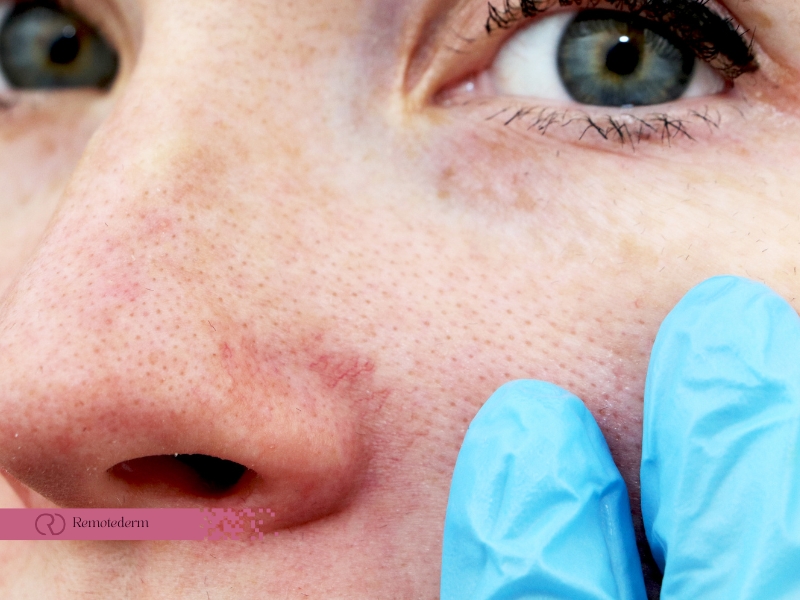Rosacea is a common skin condition that causes redness, visible blood vessels, and sometimes small, red, pus-filled bumps on the face. These symptoms can lead to discomfort and impact your confidence. In Canada, OTC rosacea treatments have gained popularity for their convenience and cost-effectiveness. This guide will walk you through the top over-the-counter options available to help manage rosacea and improve your skin health. Discover the right OTC solutions for soothing redness, reducing inflammation, and effectively managing rosacea without the need for a prescription.
Understanding Rosacea
Rosacea is a chronic skin condition that affects over 16 million Americans. It usually starts with a tendency to blush or flush more easily than others. The redness might gradually move from the nose and cheeks to the forehead and chin. Even the ears, chest, and back can become red all the time. Rosacea can affect anyone, but it is most prevalent in middle-aged women with fair skin.
Rosacea Symptoms
Rosacea manifests itself in a multitude of ways, each one unique to the individual. The most typically seen symptoms of Rosacea include:
- Facial redness: Rosacea produces chronic redness in the center of your face. Small blood vessels in the nose and cheeks may enlarge and become apparent.
- Swollen red bumps: Many people with rosacea get pimples on their faces that look like acne. These pimples can contain pus. Your skin may feel heated and painful.
- Eye problems: Many patients with rosacea suffer from dry, itchy, swollen eyes as well as red, puffy eyelids. This is referred to as ocular rosacea. In certain circumstances, rosacea’s eye symptoms occur before the skin symptoms.

Rosacea Triggers
The triggers for Rosacea can vary widely and may encompass any combination of the following factors:
- Alcohol can dilate the blood vessels in the face, causing the skin to flush and leading to a rosacea flare-up.
- Spicy foods can also cause your blood vessels to dilate, triggering a rosacea flare-up.
- Temperature extremes: Both very hot and very cold temperatures can cause a rosacea flare-up. It’s important to protect your face in extreme weather.
- Sunlight or wind: Sun exposure is a common trigger for rosacea. Wind can also irritate the skin and trigger a flare-up.
- Emotions: Stress and anxiety can cause a rosacea flare-up. It’s important to manage stress effectively to prevent flare-ups.
- Exercise: Intense exercise can cause a rosacea flare-up. However, gentle exercise like yoga or walking is less likely to trigger rosacea.
- Cosmetics: Some skin care products and cosmetics can irritate the skin and trigger a rosacea flare-up. It’s important to choose products that are suitable for sensitive skin.
OTC Rosacea Treatments
OTC rosacea treatments in Canada include a variety of options such as topical creams, oral medications, and specialized skincare products. Topical treatments like azelaic acid and metronidazole work to reduce inflammation directly on the skin, while oral antibiotics and isotretinoin help manage more severe cases internally. Choosing gentle, non-irritating skincare products is key to managing rosacea symptoms effectively. Discover the right combination of OTC treatments to soothe your skin and keep rosacea under control, all while enjoying the convenience and affordability of over-the-counter solutions.
1. Topical creams and gels
OTC rosacea treatments applied directly to the skin can significantly reduce redness and inflammation. These products often contain key ingredients like azelaic acid, metronidazole, and ivermectin. Azelaic acid works by reducing inflammation, killing bacteria, and normalizing the skin’s surface. Metronidazole, an antibiotic, helps alleviate inflammation and redness, while ivermectin targets inflammation and eliminates mites that may contribute to rosacea. Explore these effective, over-the-counter topical treatments to manage your rosacea symptoms and improve your skin’s appearance.

2. Oral medications
Oral medications can help reduce inflammation from the inside out. They are usually used for more severe forms of rosacea. Oral antibiotics like doxycycline can help reduce inflammation and redness. Isotretinoin, a powerful drug for severe acne, can also be used for severe rosacea that doesn’t respond to other treatments.
3. Skin care products
Managing rosacea symptoms in Canada can be easier with the right OTC rosacea skincare products. Certain cleansers, moisturizers, and sunscreens can make a significant difference in calming irritated skin. It’s important to choose gentle products that are suitable for sensitive skin. Look for options free of harsh ingredients like alcohol, witch hazel, fragrance, menthol, peppermint, and eucalyptus oil, as these can aggravate rosacea. For sun protection, choose a broad-spectrum sunscreen with an SPF of at least 30, containing soothing ingredients like zinc oxide or titanium dioxide. With the right OTC rosacea products, you can effectively manage symptoms and keep your skin feeling comfortable and protected.
4. Online Treatment
Rosacea online treatment options are also available. These services offer virtual consultations with dermatologists and deliver personalized treatment plans to your door. They can be a convenient option for those who cannot easily access a dermatologist. These services can provide a comprehensive treatment plan that includes prescription medications, skin care recommendations, and lifestyle changes to help manage rosacea.
Final Thoughts
Understanding rosacea, recognizing triggers, and choosing the right OTC rosacea treatment are essential steps in managing this condition. With a wide range of over-the-counter options available in Canada, you can find the treatment that works best for your skin. Keep in mind that everyone’s skin is different, so what works for one person may not work for another. Patience and consistency are key when managing rosacea. By finding the right approach, you can effectively treat symptoms and improve your quality of life, all with convenient and cost-effective OTC treatments.
FAQs
1. Can diet affect rosacea?
Yes, spicy meals and alcohol can cause rosacea flare-ups. It’s critical to discover your particular triggers and tailor your diet accordingly.
2. Are there natural remedies for rosacea?
Some people find relief with natural remedies like green tea, chamomile, and oatmeal, but their effectiveness varies. It’s important to discuss any natural remedies with your doctor before trying them.
3. Can rosacea be cured?
While there’s no cure for rosacea, symptoms can be managed effectively with the right treatment plan. It’s important to work with your doctor to develop a treatment plan that works for you.
4. Is rosacea contagious?
No, rosacea is not contagious. It cannot be spread by touch, sharing towels, or close contact. It’s a chronic skin condition that is likely caused by a combination of genetic and environmental factors.
